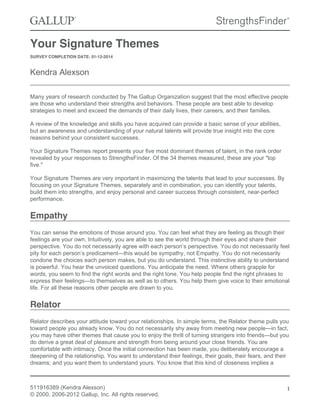Kendra Alexson completed a survey to identify her top five signature themes: Empathy, Relator, Harmony, Context, and Consistency. The report indicates that understanding one's strengths is important for maximizing talents and success. Empathy allows Kendra to understand others' perspectives and emotions. As a Relator, she enjoys close relationships and intimacy. Harmony is a guiding value for Kendra as she seeks agreement and consensus. Her Context theme helps her understand the present by looking back at past intentions and blueprints. Consistency is important to Kendra to ensure fair, even-handed, and predictable environments.


